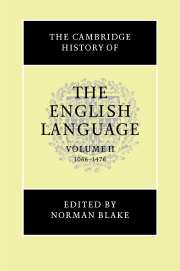5 - LEXIS AND SEMANTICS
Published online by Cambridge University Press: 28 March 2008
Summary
Lexis
Of all linguistic concepts, that of ‘word’ is the most fundamental, possessing a quality of homely familiarity which is lacking in more technical terms like ‘phoneme’, ‘morpheme’ or even ‘syntax’. Words seem to have a reality either as pronunciations or as written characters, they have grammatical rules for combination, and they have meanings: and for everyday purposes we require little more than this in order to discuss them adequately. Yet, as soon as words become the object of serious study requiring more precise definition, it is apparent that our complacency is ill-founded. Difficulties are encountered in describing with precision what constitutes that composite of form and meaning we call a word. Our ready acceptance that words can be misspelt, mispronounced or inappropriately combined confirms that their use is governed by linguistic rules, but we assume too easily that such rules are founded on an ability to recognise words as the fundamental unit of analysis. In any period this is a troublesome business, but especially so in Middle English.
That written Middle English presents a problem in the definition of any individual word by its orthographic form is a fact vividly apparent to anyone who has ever used a computer to search a text. The machine's capacity to recognise forms is relatively inflexible, but inflexibility is not characteristic of scribal spelling. The scribe who, in the late fourteenth century, wrote MS Cotton Nero A.x, Art. 3, refers within a few lines of each other to þyn aunt and þy naunt, reflecting an uncertainty about word boundaries which is sometimes exploited in the patterns of alliterative verse: ‘And worisch him as namely as he myne awyn warre’ (Wars of Alexander 582).
- Type
- Chapter
- Information
- The Cambridge History of the English Language , pp. 409 - 499Publisher: Cambridge University PressPrint publication year: 1992
- 26
- Cited by

